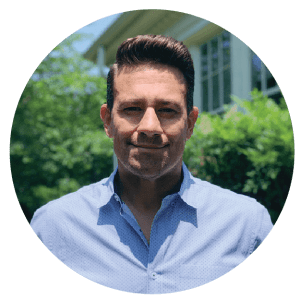Q&A with Dr. Andrew Zirschky
Professor & Director of the MAYM
 Q: How did you get to this point? What drew you to a career as a Professor of Youth Ministry?
Q: How did you get to this point? What drew you to a career as a Professor of Youth Ministry?
After about a decade as a youth director, I decided the best way to stay involved in youth ministry was to pursue more education beyond my bachelor’s degree. I enrolled at Princeton Seminary anticipating that I would graduate with an M.Div. and return to a local church, but God had other plans. I was always academically inclined, and during my M.Div. began exploring options for a Ph.D. though I still imagined returning to congregational ministry. My heart has always been with congregational youth ministry, and I only became comfortable with the idea of teaching full-time during my doctoral work when I realized I could impact the lives and faith of more teenagers through teaching than I could through hands-on youth ministry. It’s an absolute privilege and honor to teach upcoming youth pastors, but what thrills me most is knowing that the lives of hundreds of teenagers are being impacted through every course.
Q: What is it about CYMT’s partnership with APTS that you love?
I love the creativity and nimbleness that happen when a non-profit and academic institution work together to holistically concern themselves with the lives of residents and churches. CYMT and APTS each bring different foci and capabilities to the partnership, and as a result they’re able to accomplish things for students that couldn’t happen otherwise.
Q: What do you want/hope students to take away from your classes?
I hope students come away from my courses with the ability to think more deeply, richly and theologically about their youth ministry practice. I think a lot of what happens in youth ministry happens unreflectively and can be deforming to young people, and my courses are intended to give students a theological framework for evaluating and reforming their youth ministry practice.
Q: Where do you get inspiration for your class lectures?
I’m a firm believer that the best youth ministry happens when we combine knowledge from other disciplines, so my class lectures are inspired by reading and learning that I’ve been doing in psychology, sociology, educational theory, theology, and a variety of other disciplines. They’re usually also anchored in real-life situations or problems that I or others have encountered in youth ministry.
Q: What classes will you be teaching this fall? How do you see those classes as being critical to the development of youth workers?
This fall I’ll be teaching Communicating the Gospel to Youth, and it’s critical to the development of youth workers because we take a deep dive into examining what the gospel is, who youth are, and different ideas about what it means to truly communicate. All of those concepts are at the heart of youth ministry, and we don’t often realize how bound and limited our perspectives are on these issues until we really examine them. It’s always a class where students come away with a greatly expanded view of what is possible in youth ministry.
